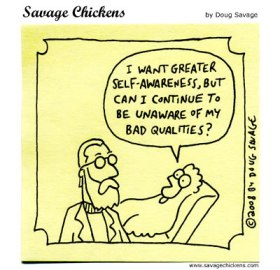For fans of Office Space, you probably recognized the immortal words of Michael Bolton when discussing the embarrassment of having the same name as that ‘no talent ass-clown’. It’s a great movie (I used to make it mandatory viewing on my team) and a very funny line…and it illustrates perfectly one of the common pitfalls of leaders everywhere – the lack of self-awareness.
We’ve all seen it. Leaders who lament the shortcomings of their people, loudly stating what those people SHOULD be doing. Well, guess what, Mr./Ms. Thang – you’re probably not doing everything right, either. I read somewhere once that we criticize loudest the things in other that we don’t like in ourselves. It’s not a 1:1 correlation (its not like we dislike an embezzler because we also embezzle); rather, it’s a reminder to think about our OWN behavior.
This talent for self-awareness is a vital component of a successful leader. Granted, it’s more fun to point out the shortcomings of others (schadenfreude, anyone?), but far less constructive. It’s the old trap of, “do as I say and not as I do” – and we all know how we’ll that turns out, right?
A few ideas on how to make self-awareness a regular part of your day:
- Admit you suck at something: I’ve mentioned many times in this blog that the reason why you’re a leader is because you DON’T suck at a lot of stuff. But you do suck at something (it’s okay, we all do). Once you’ve admitted that, you’ll be in a better state of mind to practice self-awareness.
- Get some help: Okay, self-awareness is all about you (hence the whole “self” thing). And you will eventually be able to self-monitor and make corrections to your behavior on the fly. But if you’re new to this sort of thinking, it’s a good idea to have a third party help you through observation, providing feedback, or even challenging your assumptions.
- Accept it’s going to take time: The whole concept of “he’s the one that sucks” is that you don’t want to make the effort to
 change yourself because you know it’s going to be difficult; therefore, the OTHER person should undertake that task. Tough cookies. You need to take the time and make adjustments to the only thing you can control – yourself.
change yourself because you know it’s going to be difficult; therefore, the OTHER person should undertake that task. Tough cookies. You need to take the time and make adjustments to the only thing you can control – yourself. - Check yourself before you wreck yourself: Every day, take some time to think back on the day’s activities and give yourself a grade. Did you achieve the outcomes you wanted? Did you achieve them the way you wanted to? Figure out what you want to do differently tomorrow and give it a go.
- Think like G.I. Joe: Self-awareness doesn’t come with a how-to guide. You might realize you’re doing something stupid…and have no idea how to fix it. This is where G.I. Joe comes in. Remember – now you know, and knowing is half the battle. Go, Joe!!!
So there you go. While Michael Bolton (the cool one, not the saxophone one) had a fairly good argument to refuse to change, you don’t. Practice a little self-awareness, improve yourself, and you might be surprised how much better everyone else starts getting, too.
*Check out the awesomeness of Doug Savage’s humor at http://www.savagechickens.com/
